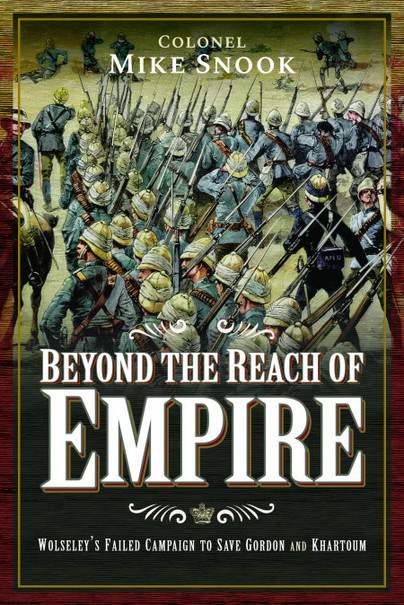Beyond the Reach of Empire (Paperback)
Wolseley's Failed Campaign to Save Gordon and Khartoum

Pages: 608
Illustrations: 16 pp plates
ISBN: 9781399013550
Published: 7th October 2022
(click here for international delivery rates)
Need a currency converter? Check XE.com for live rates
| Other formats available | Price |
|---|---|
| Beyond the Reach of Empire ePub (24.4 MB) Add to Basket | £6.99 |
In the early 1880s the Mahdi unleashed a spectacularly successful jihadist uprising against Egyptian colonial rule in the Sudan. Early in1884 Cairo bowed to British pressure to withdraw. Beyond the Reach of Empire describes how Major General Charles Gordon was despatched to evacuate Khartoum and turn the Sudan over to self-rule. It goes on to explain how and why the mission backfired, and then homes in on Sir Garnet Wolseley's planning and execution of the long-delayed Gordon Relief Expedition which arrived, according to popular myth, only two days after the city had fallen and Gordon had been killed.
Colonel Mike Snook's narrative is characterized by scrupulous attention to detail, an instinctive grasp of the period, and an intimate understanding of its setting. The author argues compellingly that the Khartoum campaign was mismanaged from the outset. The outcome is the exoneration of Colonel Sir Charles Wilson, the man cast in the role of scapegoat, and an indictment of Wolseley's generalship over the course of the last and most deeply flawed campaign of his career.
This is an engrossing tale worthy of being lifted from the realms of cinematic drama.
Society of Friends of the National Army Museum
A rich, well-written and comprehensive account by an author who has genuinely got inside the subject.
This book is a very impressive achievement, giving us a hugely detailed picture of one of the Victorian army's most difficult campaigns. Although the author has strong views, he presents his material in so much detail that we have plenty of material to use to come to our own conclusions and to judge the quality of his arguments (generally strong).
History of War
This book is an admirable tool for the wargamer, and a 'must' for the student of the period. The analysis of Wolseley's performance is perhaps a matter of opinion, but this is by any standard a masterly and enthralling account.
Miniature Wargames
A book of epic proportions that will appeal to a wide variety of readers; those who study 19th century colonial warfare; students of warfare; wargamers and anyone in public life who wishes to see how history can condemn or congratulate, fairly or unfairly. Great book, great read!
wargamer.com
This is a proper history book. There are over five hundred pages of careful reading to negotiate. The text is gripping but I occasionally felt overawed by the scale of it. You can’t rush this book. You should not want to. I’ve read a few older gems through my half century and Donald R Morris’s The Washing of the Spears springs to mind in an attempt to match scale and depth. You should read it and also find a copy of Evan S Connell’s classic saga of Custer’s demise, Son of the Morning Star. They all have their place and illustrate what a dramatic and not so one dimensional world the Victorian era of warfare appears to be from this distance. Whatever Mike Snook decides to write about next will be well worth close on a month of my reading time if he writes as big a book again.
Warhistoryonline.com
I've been an avid reader of Col. Snook's for some time (How Can Man Die Better, Go Strong Into the Desert, Great Military Disasters, Like Wolves on the Fold) and have watched this title's release date change several times and was thrilled when it was published. I have to admit only being about 25% through the book but it is once again, a pleasure to read.
Amazon Review by Frontis B Wiggins III
Col. Snook has used (exclusively, as far as I've read) original, contemporary sources, quoting extensively from journal's, telegrams and official documents (one journal in particular receives its first light of day since the time of the Sudan campaign and I received a frisson as Col. Snook described turning the pages and finding sand still trapped between the pages - okay, yes, I'm a history geek and no, I won't say whose it was as I don't want to spoil that same pleasure for others). The history is laid out in chronological order with the personages introduced as they enter the action. There are several excellent maps and plates.
This work clearly took much time and on-site research to produce and is the perfect, in-depth read for anyone who wants to delve into the effort to rescue Gordon from Khartoum. For me, the numerous original sources and Col. Snook's writing style make this a joy to read, allowing me to balance what was written at the time by the various members of the military and government with insights and hindsights to place them in the larger perspective, something not available, obviously, to the correspondents at the time.
Mike Snook's research and narrative mirror the scale of Victorian Britain's herculean effort to save General Gordon. Ultimately though the author's quest is crowned with success, not least because he brings to his story the understanding of a fighting soldier, cutting through the jingoism and bombast of earlier accounts, laying bare the reasons for the campaign's failure.
Mark Urban, author of Rifles: Six Years with Wellington’s Legendary Sharpshooters
This is an epic book worthy of the epic tale it recounts. Running to more than 560 pages (excluding the index) it is an exhaustive, forensic analysis of Wolseley’s Khartoum expedition.
Peter Weedon
From the outset, the striking element is Mike Snook’s mastery of his subject – the people and personalities, logistics and campaigns, and, his particular forte, the ground. During his research Snook had the great good fortune to walk the ground trodden by the British 130 years ago. In doing so, the desert is transformed from a rambling expanse of sand to a lively cauldron of sweating soldiers and over-burdened camels. Incredibly, on one his journeys, Snook believes he located indentations in the ground from a British defensive position. Lack of research is not a criticism to be levelled at the book.
Snook has used the primary sources extensively but not always taken them at face value. Drawing on his own military background, Snook has attempted to “join the dots” wherever details have been lost to time, such as the particular composition of troops at various stages. Conjecture and hypothesis it may be, but helpful nonetheless.
Many of the big beasts of the late Victorian era are here – Wolseley himself, Charles Wilson, Herbert Stewart, Fred Burnaby, Redvers Buller, Lord Charles Beresford to name a few. Mike Snook is unstinting in both his praise and criticism, even of those such as Fred Burnaby whose courage never faltered. The story of Sir Charles Wilson’s final - and failed - dash to Khartoum is brilliantly told.
But the failure was never Wilson’s, as Snook makes evidently clear. Snook also sweeps away the myth that Gordon was within two days of being relieved.
This is a magnificent book, and a joy to read for any serious student of the Sudan and late Victorian soldiering. It will be a work of reference for years to come.
About Col Mike Snook
Colonel Mike Snook was commissioned into the Royal Regiment of Wales and over the ensuing 30 years served all round the world in command, operations and intelligence appointments. He spent two thirds of his career overseas and saw extensive active service in four campaigns. He is a graduate of Leicester University, Sandhurst and the Army Staff College. Twice honoured for operational distinction, he was awarded the MBE in 2000. He spent four years as a British military adviser in South Africa and latterly was the head of the UN’s J3 Operations staff in Khartoum. A recognised authority on the military history of the Victorian era, he is the author of How Can Man Die Better: the Secrets of Isandlwana Revealed, Like Wolves on the Fold: The Defence of Rorke’s Drift, Into the Jaws of Death: British Military Blunders 1879-1900 and Go Strong into the Desert: The Mahdist Uprising 1881-5.



















